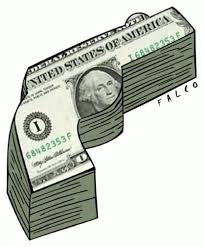Finance is the new form of warfare -- without the expense of a military overhead and an occupation against unwilling hosts. It is a competition in credit creation to buy foreign resources, real estate, public and privatized infrastructure, bonds and corporate stock ownership. Who needs an army when you can obtain the usual objective (monetary wealth and asset appropriation) simply by financial means? -- Dr. Michael Hudson, Counterpunch, October 2010
When the US Federal Reserve bought an 80% stake in American International Group (AIG) in September 2008, the unprecedented $85 billion outlay was justified as necessary to bail out the world's largest insurance company. Today, however, central banks are on a global corporate buying spree not to bail out bankrupt corporations but simply as an investment, to compensate for the loss of bond income due to record-low interest rates. Indeed, central banks have become some of the world's largest stock investors.
Central banks have the power to create national currencies with accounting entries, and they are traditionally very secretive. We are not allowed to peer into their books. It took a major lawsuit by Reuters and a congressional investigation to get the Fed to reveal the $16-plus trillion in loans it made to bail out giant banks and corporations after 2008.
What is to stop a foreign bank from simply printing its own currency and trading it on the currency market for dollars, to be invested in the US stock market or US real estate market? What is to stop central banks from printing up money competitively, in a mad rush to own the world's largest companies?
Apparently not much. Central banks are for the most part unregulated, even by their own governments. As the Federal Reserve observes on its website:
[The Fed] is considered an independent central bank because its monetary policy decisions do not have to be approved by the President or anyone else in the executive or legislative branches of government, it does not receive funding appropriated by the Congress, and the terms of the members of the Board of Governors span multiple presidential and congressional terms.
As former Federal Reserve Chairman Alan Greenspan quipped, "Quite frankly it does not matter who is president as far as the Fed is concerned. There are no other agencies that can overrule the action we take."
The Central Bank Buying Spree
That is how "independent" central banks operate, but it evidently not the US central bank that is gambling in the stock market. After extensive quantitative easing, the Fed has a $4.5 trillion balance sheet; but this sum is accounted for as being invested conservatively in Treasuries and agency debt (although QE may have allowed Wall Street banks to invest the proceeds in the stock market by devious means).
Which central banks, then, are investing in stocks? The biggest player turns out to be the People's Bank of China (PBoC), the Chinese central bank.
According to a June 15th article in USA Today:
Evidence of equity-buying by central banks and other public sector investors has emerged from a large-scale survey compiled by Official Monetary and Financial Institutions Forum (OMFIF), a global research and advisory group. The OMFIF research publication Global Public Investor (GPI) 2014, launched on June 17 is the first comprehensive survey of $29.1 trillion worth of investments held by 400 public sector institutions in 162 countries. The report focuses on investments by 157 central banks, 156 public pension funds and 87 sovereign funds, underlines growing similarities among different categories of public entities owning assets equivalent to 40% of world output.
The assets of these 400 Global Public Investors comprise $13.2 trillion (including gold) at central banks, $9.4 trillion at public pension funds and $6.5 trillion at sovereign wealth funds.
Public pension funds and sovereign wealth funds are well known to be large holders of shares on international stock markets. But it seems they now have rivals from unexpected sources:
One is China's State Administration of Foreign Exchange (SAFE), part of the People's Bank of China, the biggest overall public sector investor, with $3.9 trillion under management, well ahead of the Bank of Japan and Japan's Government Pension Investment Fund (GPIF), each with $1.3 trillion.
(Note: You can view every article as one long page if you sign up as an Advocate Member, or higher).






